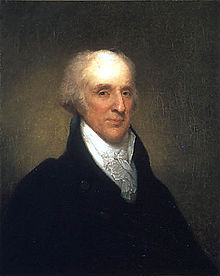John Armstrong, Jr.
| John Armstrong | |
|---|---|
 |
|
| 7th United States Secretary of War | |
|
In office January 13, 1813 – September 27, 1814 |
|
| President | James Madison |
| Preceded by | William Eustis |
| Succeeded by | James Monroe |
|
United States Senator from New York (Class 3) |
|
|
In office November 6, 1800 – February 5, 1802 |
|
| Preceded by | John Laurance |
| Succeeded by | DeWitt Clinton |
|
United States Senator from New York (Class 3) |
|
|
In office November 10, 1803 – February 4, 1804 |
|
| Preceded by | DeWitt Clinton |
| Succeeded by | John Smith |
|
United States Senator from New York (Class 1) |
|
|
In office February 4, 1804 – June 30, 1804 |
|
| Preceded by | Theodorus Bailey |
| Succeeded by | Samuel L. Mitchill |
| Delegate from Pennsylvania to the Confederation Congress | |
|
In office 1787–1788 |
|
| Personal details | |
| Born |
November 25, 1758 Carlisle, Pennsylvania |
| Died | April 1, 1843 (aged 84) Red Hook, New York |
| Spouse(s) | Alida Livingston Armstrong |
| Alma mater | College of New Jersey |
| Military service | |
| Service/branch |
Continental Army US Army |
| Years of service | 1775 – 1777, 1782 – 1783 (Continental Army) 1812 - 1813 (US Army) |
| Rank |
Major (Continental Army) Brigadier General (US Army) |
| Battles/wars |
American Revolutionary War War of 1812 |
John Armstrong Jr. (November 25, 1758 – April 1, 1843) was an American soldier and statesman who was a delegate to the Continental Congress, U.S. Senator from New York, and Secretary of War.
Armstrong was born in Carlisle, Pennsylvania, the younger son of General John Armstrong and Rebecca (Lyon) Armstrong. John Armstrong, Sr., was a renowned Pennsylvania soldier born in Ireland of Scottish descent. John Jr.'s older brother was James Armstrong, who became a physician and U.S. Congressman.
After early education in Carlisle, John Jr. studied at the College of New Jersey (now Princeton University). He broke off his studies in Princeton in 1775 to return to Pennsylvania and join the fight in the Revolutionary War.
The young Armstrong initially joined a Pennsylvania militia regiment and the following year he was appointed as aide-de-camp to General Hugh Mercer of the Continental Army. In this role, he carried the wounded and dying General Mercer from the field at the Battle of Princeton. After the general died on January 12, 1777, Armstrong became an aide to General Horatio Gates. He stayed with Gates through the Battle of Saratoga then resigned due to problems with his health. In 1782 Gates asked him to return. Armstrong joined General Gates' staff as an aide with the rank of major, which he held through the rest of the war.
...
Wikipedia
